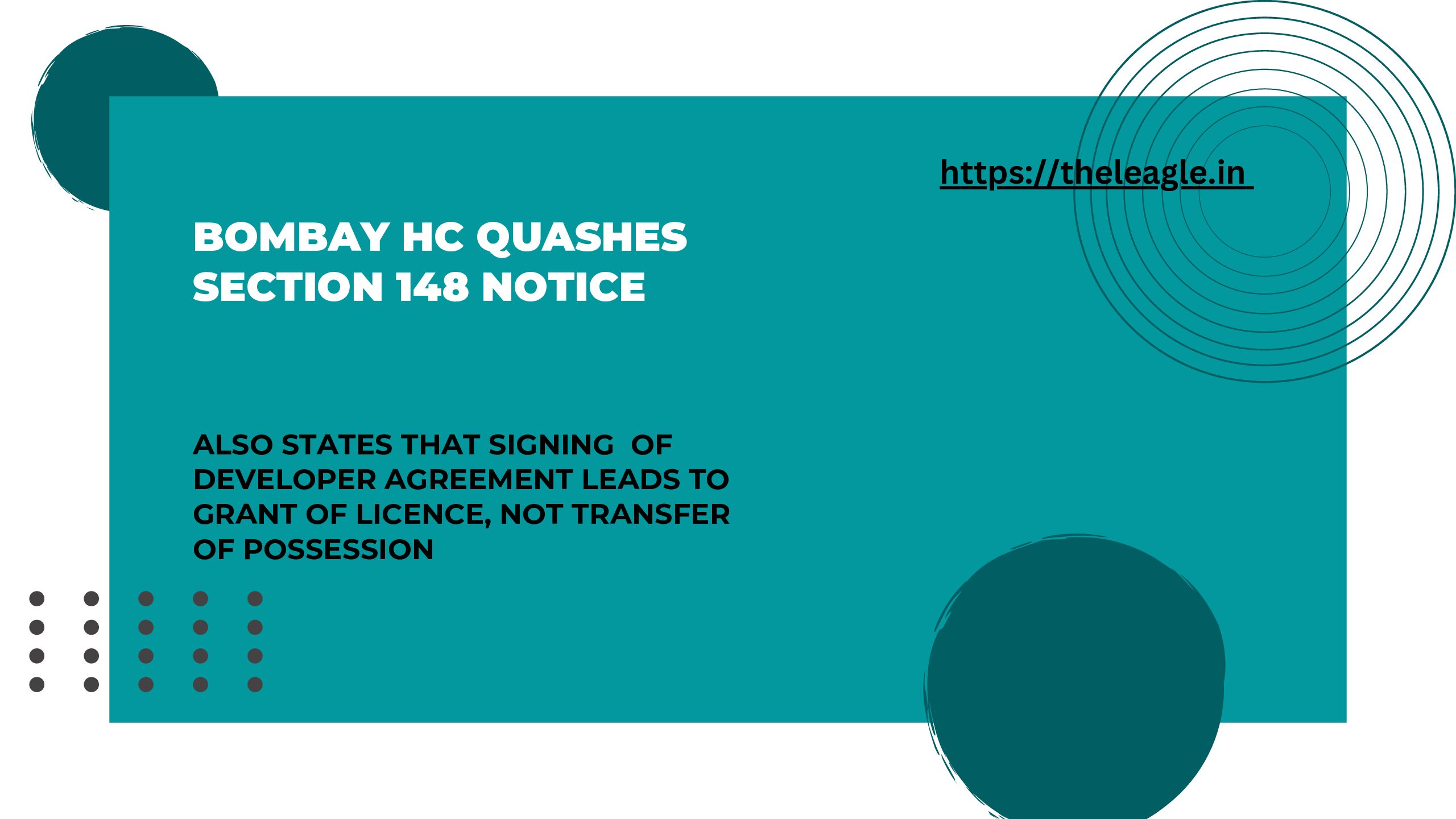The Bombay High Court in a recent judgment[1] quashed a notice issued to the assessee under Section 148, IT Act, 1961 on the ground that the assessee failed to disclose its income. The High Court also noted, in an allied issue, that the transfer of licence to a developer under a development agreement did not amount to transfer of a capital asset and was not subject to tax as capital gains.
Facts
The assessee’s return of income for the Assessment Year 2013-14 was selected for scrutiny under Section 143(2), IT Act, 1961. During the corresponding Financial Year 2012-13, the assessee, along with other co-owners, had entered into a development agreement with Ashray Developers for developing the land. In response to the query by the Assessing Officer as to why the development agreement should not be treated as ‘transfer of the said land’ and why assessee should not be assessed for capital gains, the assessee stated that the land had not been transferred. The assessee relied on Section 2(47)(v) read with Section 53A of the Transfer of Property Act, 1882 under which transfer of possession of a capital asset in part performance of the contract is treated as transfer of a capital asset exigible to capital gains. The assessee stated that the requirements of the aforestated provisions were not fulfilled in its case.
The Assessing Officer after receiving the assessee’s reply passed an assessment order under section 143(3) of the IT Act, 1961 without making any addition to the assessee’s income on account of capital gains. However, approximately 5 years later, assessee was issued a notice under Section 148 stating that its income for the Assessment Year 2013-14 had escaped assessment. The assessee’s objection to the notice were disposed by an order which was impugned before the Bombay High Court.
High Court Decides
The Bombay High Court noted that the entire reason for issuance of notice for reopening of assessment seems the development agreement which the assesee signed with Ashray developers. And that the Revenue’s objection is regarding assessee’s treatment of the land in question as stock in trade as opposed to capital asset along with the underreporting of the amount paid to the assessee for transferring right of development of land to Ashray Developers. (para 8) The High Court cited a similar decision pronounced by it a few months ago and relying on the same, held that grant of licence to a developer for the purpose of development did not amount to ‘allowing the possession of the land’ as contemplated under Section 53A of the Transfer of Property Act, 1882. Thus, granting of licence for the purpose of development of flats and selling the same could not said to be granting of possession and it would not amount to transfer of a capital asset as envisaged under Section 2(47)(v) of the IT Act, 1961. (para 10)
The Bombay High Court also quashed the reassessment notice issued under Section 148 by relying on the facts of the case. The High Court noted that the assessee had replied to the Assessing Officer’s query as to why consideration received under development agreement should not be taxed under capital gains. And the assessment order was passed after receiving the reply. The High Court relied on the well-established doctrine that if an assessee has replied to a query during assessment proceedings, it follows that the query was subject of consideration by the Assessing Officer while computing the assessment.[2] And no express reference to the query is needed in the assessment order. Thus, since the reply to the specific query on capital gains was considered by the Assessing Officer, the pretext of non-disclosure of income cannot be used to issue a reassessment notice under Section 148. On this ground alone, the High Court said that the notice under Section 148 needs to be quashed and set aside. (para 10)
Conclusion On both the issues, the Bombay High Court made pertinent observations and correctly rejected the Revenue’s stance. Neither was the issuance of reassessment notice justified nor was the argument that the transfer of development rights amounted to transfer of capital asset. This is especially when identical issues have been decided by Courts with similar results.
[1] Darshana Anand Damle v Deputy Commissioner of Income Tax, Central Circle 3(4), Mumbai, available at https://taxguru.in/wp-content/uploads/2023/09/Darshana-Anand-Damle-Vs-DCIT-Bombay-High-Court.pdf (Accessed on 28 September 2023).
[2] Aroni Commercials Ltd v Deputy Commissioner of Income Tax 2(1), Mumbai & Anr 2014 (44) taxmann.com 304 (Bombay).
